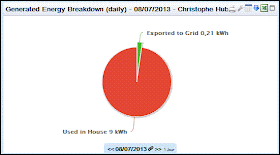After my 2 first Full Days of Solar Production, I can see that 2/3rd of the Energy used comes from Solar - Direct or Stored & Given back - and that almost all the Solar Energy has been self consumed in-house :-)
This validates that my DIY ESS works :-) !!




(Graphs are from Wattson Professional, because Wattson Anywhere is still in beta testing and sometimes figures are not accurate for now)
This validates that my DIY ESS works :-) !!




Simply amazing. So glad to see your system running well. It looks like you are using your ESS to save your excess power and use it later when production is down. Are you not allowed to put your excess power onto the grid? Net metering, in the US, is nice because you sell power during peak demand, and buy it back at night at a much cheaper rate. I haven't researched the state of the industry in over 10 years, but one of the big drawbacks to grid tie was lack of backup power when the grid was down. When I get around to installing my own system, I think something along the lines of your ESS could be used to provide back-up power. The issues I can see would be providing the inverter with an AC signal, because I believe grid-tie invertors need this to synch up to the grid and won't run without it, and isolating the house circuits from the utility, so that you don't energize the utility power lines, causing a safety issue when the utility repair workers are expecting dead power lines.
ReplyDeleteHi Joey,
ReplyDeleteThanks ! Yes I am happy to see that the system I designed is working as planned with a real solar production :-)
That is exactly the purpose of my ESS: take all the excess power and store it into the batteries, for re-use later in the evening, but it can also come on during the day and help if there is the house Usage is higher than the solar production
No in France there is nothing like Net Metering and it is a shame; Most people doing a solar install will sell the whole production to the grid, basically to make money on the FIT that is 3 times the purchase price (but starting to come down).
This is not my goal here, I wanted to be as self-sufficient as possible, and anyways I do not have any contract with the utility company, I started this as an experiment mostly, and now I realize it really works and could be done by many to lower the production based on nuclear and fossil fuels.
You are right about the fact that my ESS is an On-Grid system, meaning that if there is a black out, all the system would stop (charging or discharging), but as I said in my DIY ESS Kit blog, the batteries are there and could be easily used, via a regular pure sinus inverter wired onto their terminals, to power aplliances around the house.
Here in France, it is just hyper rare to have a black out (in Paris), I think we had maybe one in the last 10 years, but it is possible to work something out using the pack and a let's say 5000W inverter for temporary use before the power is back on
I forgot to mention that low rate electricity here is from 10:30 PM to 6:30 AM and the price is half price compared to its price during the day
ReplyDeleteChristophe, good points about the reliability of the grid and the availability of the batteries to be used to power a backup inverter, if needed in a pinch. I've only lost power a couple times in the last 15 years, and never for more than a couple hours. Sometimes trees fall on the power lines during stormy weather. You did a great job. I look forward to your future posts with performance data, system adjustments, lessons learned, and if your energy use patterns change now that you have instrumented your consumption and production. Congratulations.
DeleteJoey,
ReplyDeleteThanks again :-)
I did not change anything to my energy consumption patterns now, because I already did that several years ago (LED lighting, heat pump, etc)
Actually, it is amazing that the sizing of my ESS matches almost perfectly my solar system; There is a part of luck in there: these last days, with the best production possible (sun all day, long days) and a low consumption at home, the battery pack, empty in the morning, is almost full at night ... and the number of chargers is almost perfect, I could add one to be a perfectionist and get the extra 100W I am not capturing during lunch time :-) this tells me I do not need to double my ESS capacity - from 5 to 10kWh - for example, because I would not be able to produce enough to fill it anyways
For more graphs and updates, I posted two more tonight